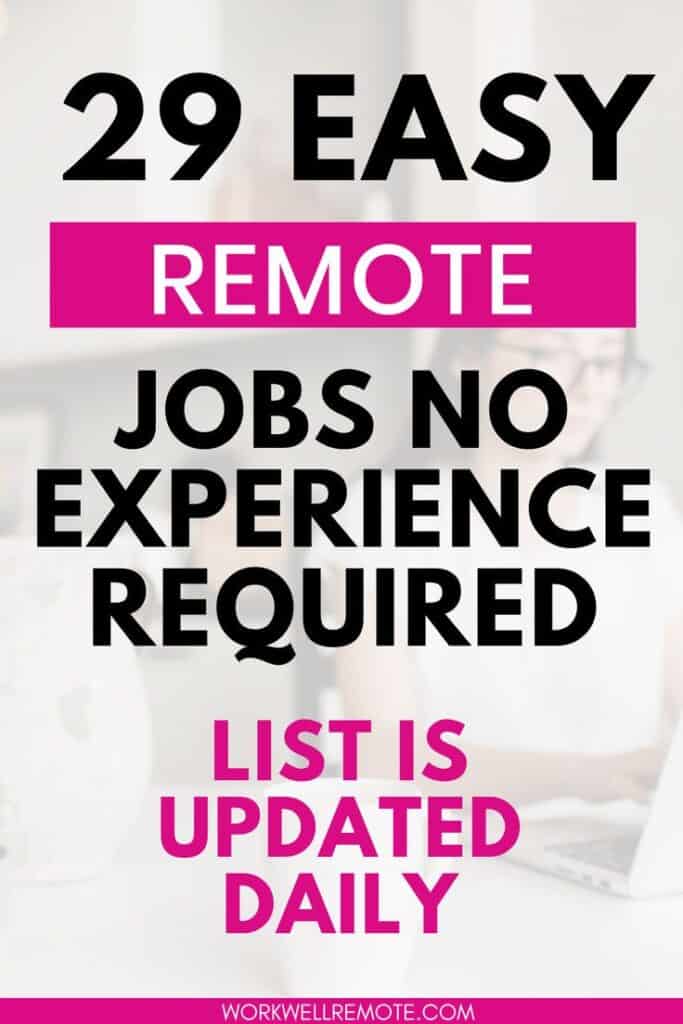This post may contain paid and/or affiliate links. I make a small commission at no extra cost to you. Please see our Privacy Policy.
Scroll down for the Work Well Remote Job Board
workwellremotely@gmail.com
Remote job boards are WAY better for discovering job opportunities that you can perform from anywhere.
Linkedin and Indeed may have remote jobs but they don’t cater to them.
I always have had better luck with jobs that are specifically catered to working from home.
Top Remote Job Board Websites

How Remote Work Has Improved My Life – And Why It Can Improve Yours Too
As a virtual assistant working from home for the past three years, I’ve come to appreciate the many benefits of remote work.
From personal savings to contributing to a greener planet, the perks go far beyond just skipping the commute.
I want to share how remote work has made my life better and how it could do the same for you.
Why Remote Work Saves Me Money – And Could Save You Money Too
Working from home has led to significant cost savings for me.
When I first made the switch to remote work, I was amazed by how much I saved.
I no longer needed to spend on gas, work clothes, or lunch breaks at restaurants.
Instead, I can work in comfortable clothes (usually sweatpants) and prepare meals at home, which is healthier and more budget-friendly.
As someone who loves to cook, this was honestly such a blessing.
On top of that, there are hidden savings I hadn’t anticipated.
My car is now in better condition because I drive less, and I’ve noticed lower maintenance and fuel costs.
Employers can benefit from these savings too.
By reducing office expenses, they’re able to reinvest in other areas of their business, which can improve overall company resources and, in some cases, lead to better employee perks.
I say we should just ditch all office buildings and turn them into affordable housing buildings… but I won’t get into that.
How Working from Home Helps Me Contribute to a Greener Planet
One of my favourite things about working remotely is knowing that I’m reducing my carbon footprint.
Before I worked from home, I used to drive every day.
Now, my car stays in the driveway most days, which reduces emissions and helps me feel like I’m doing my part for the environment.
Beyond commuting, remote work encourages energy efficiency in ways I hadn’t considered before.
Working from home allows me to control my energy usage and I’m more mindful of turning off lights and electronics when not in use.
Employers are also embracing sustainability by reducing their energy consumption in now-smaller offices or even operating without a physical office space at all. Collectively, these changes add up to make a real impact.
My parent’s friend, Greg, who is a professor at UofT actually wrote an article about this that is super interesting. Read it here.
Personal and Organizational Financial Advantages
In addition to personal savings, remote work has a variety of financial benefits for both employees and employers.
Remote workers can sometimes claim home office expenses on their taxes, which adds a bit more savings at tax time.
As someone who is self-employed, this is a big benefit.
From the employer’s side, reduced overhead costs (like office space, utilities, and office supplies) mean they can allocate resources toward other priorities.
The financial benefits of remote work go beyond dollars and cents.
Working from home has allowed me to invest in things that genuinely matter to me, like professional development courses and equipment upgrades to improve my home office.
I’ve purchased two courses this year and I plan to purchase more.
It feels good to know that I’m able to grow in my role as a virtual assistant without added financial stress.
Frequently Asked Questions About Remote Work
I often get questions from people who are curious about remote work, and I’m always happy to share what I’ve learned from my journey.
What are the perks of remote work for team members?
Remote work offers flexibility that’s hard to beat. For me, this means being able to set up a personalized workspace that feels comfortable and inspiring. No more crowded office cubicles – my home office is my own little space, designed to help me stay focused and comfortable.
How does remote work contribute to an employee’s work-life balance?
Working from home has made it much easier to balance my work with personal responsibilities. For instance, if I have an appointment in the middle of the day, I don’t have to worry about a long commute back to the office.
I can also take short breaks to recharge or handle personal tasks without feeling stressed about the time lost to travel. I also love random walks during the day, it really helps to clear my head and hit my step goal.
In what ways can working from home benefit your health?
One unexpected benefit of remote work has been the positive impact on my health. Since working from home, I’ve started cooking healthier meals instead of relying on takeout. I also take small breaks to stretch or do quick exercises, which I never used to do in an office setting.
What are the potential downsides for staff who work remotely?
While remote work is fantastic, it’s not without challenges. Sometimes, I do miss the social interactions of an office environment. To combat this, I make a conscious effort to stay connected with my colleagues through virtual coffee breaks or quick chats, but it’s still something to be aware of if you’re considering remote work.
Does working out of the office boost overall happiness?
For me, absolutely! The freedom and flexibility of working from home have had a profound effect on my happiness. I can design my own work environment, set my own pace, and truly enjoy the balance that remote work offers.
How can employers gain from offering remote positions?
Employers can benefit from remote work just as much as employees do. By offering remote positions, companies can access a broader talent pool, attracting people who may not be willing or able to relocate. I’ve also found that remote work tends to increase employee satisfaction and retention because it allows for a healthier work-life balance.

Pretty! This has been an extremely wonderful article.
Thanks for supplying this information.
Your style is so unique compared to other folks I have read
stuff from. Many thanks for posting when you’ve
got the opportunity, Guess I’ll just book mark this blog.
Matthew, this is so interesting! Have you ever seen a chrism recipe? For the Roman Catholics in this country, each archdiocese (I’m not sure about diocese) makes chrism during Holy Week at “Chrism Mass” A bottle of balsam bought from one of a few companies that make it in the USA is poured into olive oil Then it is blessed by the bishop with a prayer at the Mass It’s that quick and easy in true Roman style I must say the balsam smell is strong and beautiful! I’ve helped prepare the chrism oil for the service for several years now (Although never again, I will miss that fragrance that could last for days)